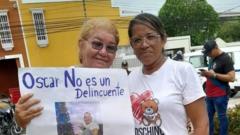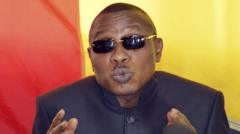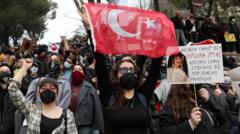As the plight of Venezuelans deported to El Salvador's notorious mega-prison unfolds, families are left devastated and questioning the legal process behind their detention.
Venezuelan Migrants Face Unjust Incarceration in El Salvador's Mega-Prison

Venezuelan Migrants Face Unjust Incarceration in El Salvador's Mega-Prison
Controversy Grows Over Deportation of Innocent Venezuelans to Cecot Facility
In the sweltering heat of Zulia state, Venezuela, Gertrudis Pineda grapples with despair over her son Oscar, one of 238 Venezuelans deported by the US to the "Terrorism Confinement Centre" (Cecot) in El Salvador. With no clear information on Oscar's condition, Gertrudis recalls how he sought the American Dream in Dallas, working as a carpet installer while sending money home for his ailing father's medical needs. Their lives took a dramatic turn when US Immigration and Customs Enforcement (ICE) agents detained Oscar, and rather than returning him to Venezuela, he ended up in a facility infamous for housing dangerous gang members.
Amidst political turmoil, the Trump Administration removed the Venezuelans under the Alien Enemies Act, amidst accusations of gang affiliations with Tren de Aragua, despite many detainees having no criminal records. Gertrudis learned about Oscar's fate only through her other son in Colombia, who spotted his name on television. Now, images of shaved-headed detainees processed in harrowing conditions fill her with anguish.
Activists criticize the Cecot as a "black hole of human rights," with concerns about the well-being of these deported individuals. Salvadoran immigration expert Napoleon Campos argues the deportation is unconstitutional, noting that a significant number of the detainees had no prior offenses in any of the involved countries. Campos emphasizes the broader implications, claiming El Salvador has become a realm of illegality that actively violates constitutional rights.
The legal struggle for these detainees now falls to Jaime Ortega, appointed by Venezuelan Vice-President Delcy Rodríguez. He seeks clarity on the terms of the deportation and argues for a more humane alternative to incarceration in a facility meant for violent criminals. While President Nayib Bukele faces criticism, he defends his aggressive anti-gang measures, emphasizing their positive impact on Salvadoran society, despite the evident rise in social unrest and human rights violations.
For families like Gertrudis', the personal toll is immeasurable. As she takes care of Oscar's eight-year-old son, she calls her son's unjust detention a form of kidnapping. "If they have committed any crimes, they should answer in Venezuela," she pleads, yearning for her son's return amidst the chaos and uncertainty surrounding his fate.
Amidst political turmoil, the Trump Administration removed the Venezuelans under the Alien Enemies Act, amidst accusations of gang affiliations with Tren de Aragua, despite many detainees having no criminal records. Gertrudis learned about Oscar's fate only through her other son in Colombia, who spotted his name on television. Now, images of shaved-headed detainees processed in harrowing conditions fill her with anguish.
Activists criticize the Cecot as a "black hole of human rights," with concerns about the well-being of these deported individuals. Salvadoran immigration expert Napoleon Campos argues the deportation is unconstitutional, noting that a significant number of the detainees had no prior offenses in any of the involved countries. Campos emphasizes the broader implications, claiming El Salvador has become a realm of illegality that actively violates constitutional rights.
The legal struggle for these detainees now falls to Jaime Ortega, appointed by Venezuelan Vice-President Delcy Rodríguez. He seeks clarity on the terms of the deportation and argues for a more humane alternative to incarceration in a facility meant for violent criminals. While President Nayib Bukele faces criticism, he defends his aggressive anti-gang measures, emphasizing their positive impact on Salvadoran society, despite the evident rise in social unrest and human rights violations.
For families like Gertrudis', the personal toll is immeasurable. As she takes care of Oscar's eight-year-old son, she calls her son's unjust detention a form of kidnapping. "If they have committed any crimes, they should answer in Venezuela," she pleads, yearning for her son's return amidst the chaos and uncertainty surrounding his fate.





















